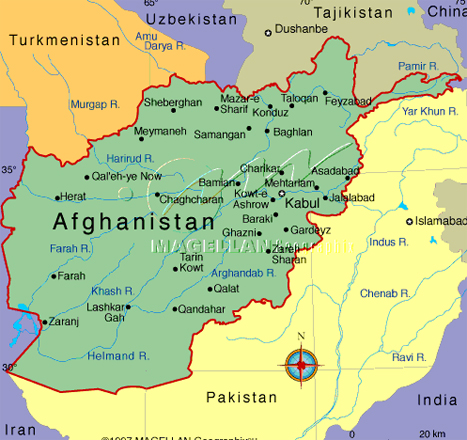The NATO-led military coalition in Afghanistan is going to implement stricter rules against airstrikes, officials said Tuesday, in an attempt to defuse a thorny issue between the alliance and the Afghan president, dpa reported.
"General (John) Allen has directed that no aerial fires be delivered against civilian dwellings," said Colonel Gary Kolb, an official with the NATO-led forces. "This measure is intended to end civilian casualties among Afghan civilians in their homes."
However, he said that the limitations upon airstrikes "should not affect military operations in general."
Furthermore, Kolb noted that only a "very small" number of airstrikes have every targeted structures, even under current policies.
"According to our statistics, the coalition conducted over 1,300 close-air support engagements in the past six months," Kolb told dpa. "Of those missions, 32 involved air-delivered ordinance (bombings) against civilian dwellings and five incidents resulted in civilian casualties."
On Tuesday, Afghan President Hamid Karzai took a strong stance against the airstrikes, mostly conducted by US forces, and said the NATO-led coalition should not fire upon civilian-populated areas under any circumstances, even in self-defence.
"It is completely banned, absolutely banned," Karzai told a news conference from his fortified palace in Kabul.
His comments come a week after an airstrike in eastern Logar province resulted in the death of Afghan civilians.
Officials allege 18 civilians, including four women and nine children, were killed. The military coalition did not specify the exact number, but Allen apologized for the deaths to Karzai and the Afghan population.
"The agreement has been reached clearly with NATO so that no bombardment of civilian homes, for any reason, is allowed. We rather consider it an absolute disproportionate use of force," Karzai said.
"The war on terror cannot be won by fighting in Afghan villages ... or by bombarding Afghan homes and villages."
NATO officials disagreed somewhat with Karzai's statements.
"There will, of course, be nothing in the preclusion against (an) airstrike in possible self-defence measures taken by the forces," a NATO official said on condition of anonymity.
Kolb also said the international forces "retain the right to attack for self-defence, but it will be extreme circumstances." He would not comment on Karzai's remarks.
The dispute is an example of the ongoing strained relationship between Karzai and his allies.
Many Afghans resent the international forces - around 130,000 are currently present in the country - due to civilian casualties inflicted upon them. Even Karzai has called the issue of civilian casualties "a serious tension with allies, NATO and the US."
Since April, Afghan commanders have been more closely involved in ground operations. But, in many instances, it is still the top echelon of the coalition military that call the shots for top raids and airstrikes.
NATO-led coalition to limit airstrikes on civilian-populated Afghan areas
The NATO-led military coalition in Afghanistan is going to implement stricter rules against airstrikes, officials said Tuesday, in an attempt to defuse a thorny issue between the alliance and the Afghan president, dpa reported.






